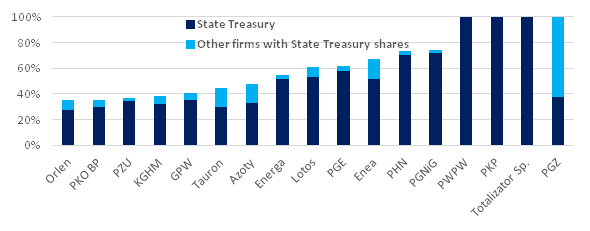The Law and Justice Party (PiS) has been using state-owned enterprises (SOEs) to push for changes in the justice system that are detrimental to rule of law, economic growth, and civil liberties. At the same time, SOEs saved the Polish Mining Group (PGG) from bankruptcy and the Polish Insurance Company (PZU) participated in the nationalization of the Pekao bank increasing politicization of the banking sector. These are all consequences of a lack of privatization.
In contrast to the OECD countries, the Polish economy is characterized by a very large share of state-owned enterprises, including as many as twelve companies from the WIG-20 index (the twenty largest companies on the Warsaw Stock Exchange). This negatively affects the economy and the standard of living in Poland and allows politicians to use subordinate companies for party purposes.
In November 2016, Prime Minister Beata Szydło, together with the heads of 17 state-controlled companies, announced the founding of the Polish National Foundation (PFN). Each of the 17 founding enterprises has a high share of the government ownership (See: Figure 1). In four of them, the government is the sole shareholder. In seven of them, although the government and its controlled companies have less than 50 percent of the shares, the government maintains a dominant position due to the fragmentation of other investors, among other reasons. In total, the companies contributed PLN 97.5 million to the foundation (PFN).
|
Figure 1. State shares in the founding companies of Polish National Foundation |
|
Source: FOR, own elaboration based on stooq.pl, company and Ministry of Treasury data |
On September 8, a campaign was launched to promote the harmful changes in the justice system proposed by PiS. It is definitely an initiative of the ruling party, what can be seen from the fact that two of these projects – the Law on the Supreme Court (vetoed by the president), and the Law on the System of Common Courts (implemented by PiS) – were submitted by groups of PiS MPs, not the Council of Ministers.
Moreover, it can be assumed that the purpose of the campaign is to influence the shape of the alternative reform projects currently being prepared in the President’s Chancellery. The campaign is financed by PFN to the amount of about PLN 19 millions. Although the aims of the foundation are expressed in its statute [1] very vaguely, the promotion of political parties’ legislative proposals – especially those relating to the judiciary – is hardly among them. The involvement of SOEs in the activities of the ruling party shows how minority investors’ rights are ignored. They are treated only as a source of capital.
At the same time, acting through the PFN, the government transfers public funds to people related to the ruling party, circumventing the public procurement law. The campaign, commissioned by PFN, is run by Solvere, a company founded by Piotr Matczuk and Anna Plakwicz, who were responsible for the last two election campaigns of PiS and the later work in the Council of Ministers. The Foundation is not subject to the public procurement law, so the selection was made without any proper procedures[2].
There are also other cases where the government uses state-owned enterprises for political purposes. For example, companies controlled by the government support unprofitable mining sector and help the government in “repolonization” (i.e. nationalization) of banks.
In order to avoid politically inconvenient insolvency and layoffs in the Polish State Mining Group (Polska Grupa Górnicza, PGG), the government bypasses the EU ban on public aid by subsidizing the company through other SOEs. Over the past 1.5 years, companies controlled by the Treasury have recapitalized PGG to the amount of PLN 3 bn, and yet it already requires the third round of capitalization. The company economizes on investment instead of shutting down unprofitable mines and reducing personnel costs, which negatively affected its production potential[3].
Under the disguise of the “repolonization” of banks, the government used PZU (the Polish Insurance Company) to buy back Pekao from the foreign owners. It was done in spite of extensive research, pointing out that state-owned bank lending policies are politically oriented and that a high share of the government control in the banking sector increases the risk of a banking crisis.
State-owned enterprises are used for party purposes. But even if that were not the case, the state should not be at the same time a market player and a regulator determining the rules of the market. Because if it is, state economic activity may affect regulatory policy, as in the case of the Bialowieza Forest. The government of Beata Szydlo is moving in the opposite direction: towards further nationalization of companies and a takeover of independent regulators, as it happens with the Energy Regulatory Office[4].
Politicization of Polish National Foundation (PFN) (and of the public media) as well as the use of subscriptions and advertisements of state-controlled companies to finance pro-government newspapers, demonstrates that maintaining state ownership of businesses not only jeopardizes economic growth but can also be dangerous to civil liberties. State-owned enterprises cannot be successfully depoliticized without their full privatization and elimination of political control over them.
This article is based on the article published in Polish on September 11, 2017.
[1] https://siecobywatelska.pl/wp-content/uploads/2017/09/Statut-PFN-2.pdf
[2] Gazeta Wyborcza, Kto zarobi na kampanii informacyjnej PiS? Zlecenie dla ludzi Szydło, Kondzińska, A., Szpala, I., 09.09.2017, http://wyborcza.pl/7,75398,22344827,dadza-zarobic-ludziom-szydlo.html
[3] Dziennik Gazet Prawna, Ściśle tajny plan podziału węglowego giganta, Baca-Pogorzelska, K., 07.09.2017, http://serwisy.gazetaprawna.pl/energetyka/artykuly/1069304,plan-podzialu-weglowego-giganta.html
[4] WysokieNapiecie.pl, Zaostrza się spór między Ministerstwem Energii i URE, Derski, B., Derski, B., Zasuń, R., Piszczatowska, J., 07.09.2017, http://wysokienapiecie.pl/rynek/2532-zaostrza-sie-spor-miedzy-ministerstwem-energii-i-ure




